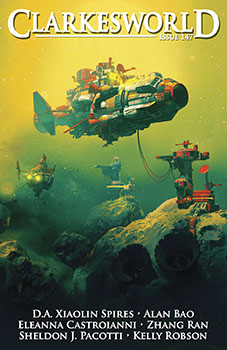
Cover from Clarkesworld Magazine Issue #147
Bringing Down the Sky is a reminder that without action, the more prosperous will take advantage of underrepresented groups due to the fundamental structure of society. Alan Bao has written a provoking story that manages to compose the perspectives of an array of characters into a coercive piece of short fiction.
The full text can be found in Issue 147 (December 2019) of Clarkesworld Magazine.
Design
The main storyline and the sub-stories that emerge from it all revolve around a small Chinese town that is buried under an unbreathable smog. Through the eyes of a small boy, you learn that the town’s inhabitants collect clean air from the Big Sky Ridge, a mountain pass accessible from the village, to export for buyers across the globe (also affected by the smog). The boy acts as a guide for two Americans trekking to the top of the Big Sky Ridge to collect air under seemingly suspicious motives.
The story is broken up into sections that are told through the eyes of several characters, some inside the town and some in other parts of the world. Each character has an entirely different perspective, with clearly distinct motives:
- The innocent boy, looking to show the Americans how to collect clean air.
- Wesley, an American entrepreneur seeking to overtake the local’s air-collection business
- Dhampa, a bitter and critical local who profits from the clean air business, and sees the visiting Americans as opportunists.
- Stephan, a seemingly good-hearted American looking to improve the lives of the locales.
- Dr. Zhang, a local doctor that has powerful connections outside the small town.
Thoughts
By using an array of characters, Alan Bao depicts how individuals take part in critical situations that erode the communities around us. We learn about the intentions of Wesley, the greedy American:
Look: it wasn’t supposed to be difficult. Just go in, get the lay of the business, pay off a few officials, and establish the contacts needed to circumvent the usual routes of imported air.
The innocent boy, on the other hand, is completely oblivious to Wesley’s strategy, choosing to focus on a hint of altruism coming from Stephan, the other American who befriends him. Dhampa, on the other hand, is one of the middlemen that the Americans are trying to circumvent. The boy criticizes Dhampa for this:
“And you only need people like me to bring it to you, so you can sell it to them,” he murmurs. The frankness in his voice is a pleasant surprise. No self-pity or rancor—just the acknowledgement of a simple truth: the starving will sell to the poor, who will sell to the middlemen, who will sell to the rich. The chain goes on and on, and those at the top will always find a way to live well, even when the world chokes and starves around them.
Dhampa is depicted as the villain in this scenario. Alan Bao presents some provocative social commentary on Dhampa, who is criticized by both the innocent boy and Dr. Zhang for trying to profit from dubious events:
Zhang gives me a pitying look. I ignore him. On matters of medicine, the man may be an expert; but on matters of life, he knows nothing. There are certain truths about the world that the well-fed and -watered cannot know. Without money, a man cannot make a life for the woman he loves. Without money, one cannot buy justice, as the rich do in their courts of law; cannot buy mercy, as politicians do in their courts of public opinion; he cannot buy the voice to express himself, locked out as he is from the satellite and intranet stations that would otherwise happily broadcast the most puerile of opinions from the rich and famous. Penniless peons die every day, anonymously and under terrible duress; but it is the wealthy folks in the big cities who fill the tribute sections of newspapers when they drop dead, having bought their legacy in sponsorship deals and billion-yuan houses.
Alan Bao adds a nice touch of commentary:
There are few things the rich love more than complaining about the penny-pinching habits of the poor. Money certainly isn’t everything—especially to those who have an abundance of it.
Final Review
Bringing Down the Sky is a prediction about how society will continue if we passively let the powerful take advantage of the less prosperous. It choses to focus on morales and society instead of scientific speculation. It’s an enjoyable read that conveys a meaningful message, well worth your time.